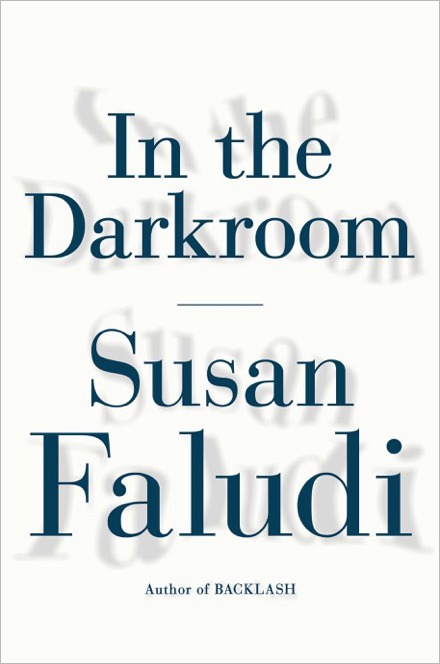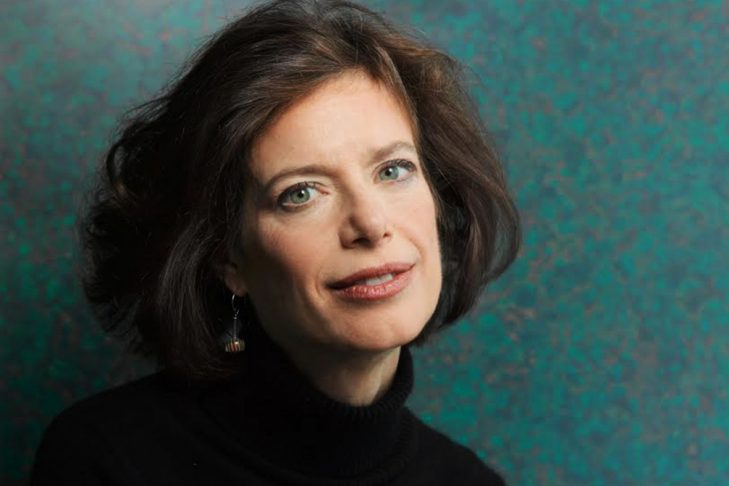In 2004, Susan Faludi, a Pulitzer Prize-winning reporter and noted feminist known for her groundbreaking books, including “Backlash: The Undeclared War Against American Women,” received an email out of the blue from her father, Steven Faludi. At that point, she had been estranged from her father for decades.
“I’ve got some interesting news for you,” her father wrote. “I have decided that I have had enough of impersonating a macho aggressive man that I have never been inside.” Seventy-six-year-old Steven announced that he was now Stefánie and attached photographs of herself as a woman, some of them taken in the Thai hospital where she had gender reassignment surgery.
“In the Darkroom,” Faludi’s new book, is a memoir of her difficult relationship with her Holocaust-survivor father that also investigates the meaning of gender, nationalism and Jewish identity. Faludi, who teaches gender studies at Bowdoin College in Brunswick, Maine, will be the keynote speaker at the Boston Book Festival on Saturday, Oct. 15, 2016.
Faludi recently spoke with JewishBoston about her book and her father’s complex life.
Why do you think your father wanted to become a woman?
My father’s desire to be a woman was undeniable and persistent and probably went way back to early childhood. At the same time, there were also many submerged dynamics and motivations that went into my father’s desire to be free of a past that she felt humiliated or ashamed of. There was also the desire to be taken care of, maybe a desire to be loved. One of the central points I took from this experience is how you can’t really pull identity—gender identity, national identity or any kind of identity—out of this larger fabric of our history, personal, cultural and social. They’re all intertwined.
How did your father’s career as a photographer fit in with the various identities she had in her life?
My father gave me the gift of many, many metaphors. If I turned my father’s story into fiction, no one would believe it. My father’s photographic career was devoted to altering the photographic image. He spent a lifetime in the darkroom, altering some of the most celebrated photographers of the post-war years in New York, like Richard Avedon, Irving Penn and Francesco Scavullo. My dad also worked a lot for Condé Nast, doing montages, color conversions and techniques known deliciously as “masking” and “dodging.” All of this my father referred to as “trick photography.” I remember my father saying the key to it is exposing only what you want exposed. That was an ongoing theme in my father’s life—controlling the image, altering the image and then presenting to the world only what he/she wanted seen.
Your father was a closed person. As a woman, did she open up more about her Jewish identity?
She came to that. But when I first came over to Budapest, she didn’t want to talk about it. We would even have arguments about how Jews were treated in Hungary. Even though she would give me horrific anecdotes about how she was treated as a Jew, she said people made too much of that. The way that my father’s Jewish identity and gender identity were in conversation with each other was very complicated and confusing. Toward the end of her life she dropped that opposition of gender and religion and wasn’t so insistent about being the 1950s Doris Day woman, which was how she presented at the beginning of her change. She was more open to acknowledging her Judaism.
You were estranged from your father for many years. That estrangement seemed to start in earnest when he broke into your house in 1976 and stabbed your mother’s boyfriend. In addition to experiencing that trauma, what else changed for you that night?

Your father’s relationship with his own parents was fraught. How did he come to rescue them during World War II?
My father grew up as the only son of wealthy and assimilated Jewish parents with a retinue of governesses, servants and tutors. He was a very lonely, but very privileged and pampered, child. All of that changed with the coming of the war. My grandmother was rounded up in a yellow-star house in Budapest. My grandfather took refuge in wealthy friends’ homes. My father ended up as an urchin on the streets trying to pass as a Christian with false identity papers and a fascist armband he got ahold of. With that armband and a rifle that had no bullets he was able to go into a Swiss-protected house where, at that point, my grandparents were staying, and rescue them.
My father had learned that this protected house was about to be raided by the Hungarian fascist party Arrow Cross, which was happening throughout Budapest in the late fall and winter of 1944. Jews were dragged out of these so-called protected houses and either deported, shot by the thousands into the Danube or sent on death marches west to Germany. My father, who didn’t look particularly gentile, who only had this armband and rifle, marched up to the protected house and announced that he was there to arrest my grandparents. Remarkably, he got away with the ruse. My father charged upstairs and marched his parents out at gunpoint, at which point my grandparents went into hiding and remained through the siege in a cellar on the outskirts of the city.
Why did your father return to Hungary in 1990, a place that isn’t friendly to trans people or Jews?
I struggle with that question all the time. Did my father go back to finally be accepted in the culture that had rejected him and our family so brutally during the Holocaust? Or did my father go to Hungary to snub her nose at a culture that didn’t accept her? “You didn’t like me as a Jew—now try this on for size. Now I’m going to be a trans woman in a culture not at all LGBT-friendly.”
I think she wanted to go somewhere she felt was her homeland. From the moment she came back, her experiences in Hungary made clear this was not an embracing homeland. In one of her earliest visits when she was still a man, my father was taking photographs of The Great Synagogue, which was still in ruins. A group of Hungarians were there. My father was speaking English and they thought he couldn’t understand Hungarian. They started saying, “Why would anyone take photos of this place?” and “Those dirty Jews deserved to be gassed.” It was clear that [Hungary] would not take my father in with open arms, but she returned anyway. The desire to belong to something, to feel connected, to feel tethered, was powerful for my father.
Did your father read your book before she died in 2015?
I offered that to her and she didn’t take me up on it. It’s one of the many mysteries of my father. A year before she died, she was very pleased that I had written the book, even though I told her there were a lot of things in the book she wasn’t going to like. I wonder now if that factored into her decision not to read it. In a funny way, my father rather unexpectedly was presenting me with a great gift at the end of her life—permission to be honest about her and about our relationship. Perhaps also my father finally wanted to be revealed, even through the parts of her story that she wasn’t particularly proud of. I think it’s a rather brave decision, and I hope I honored it.
This post has been contributed by a third party. The opinions, facts and any media content are presented solely by the author, and JewishBoston assumes no responsibility for them. Want to add your voice to the conversation? Publish your own post here. MORE



